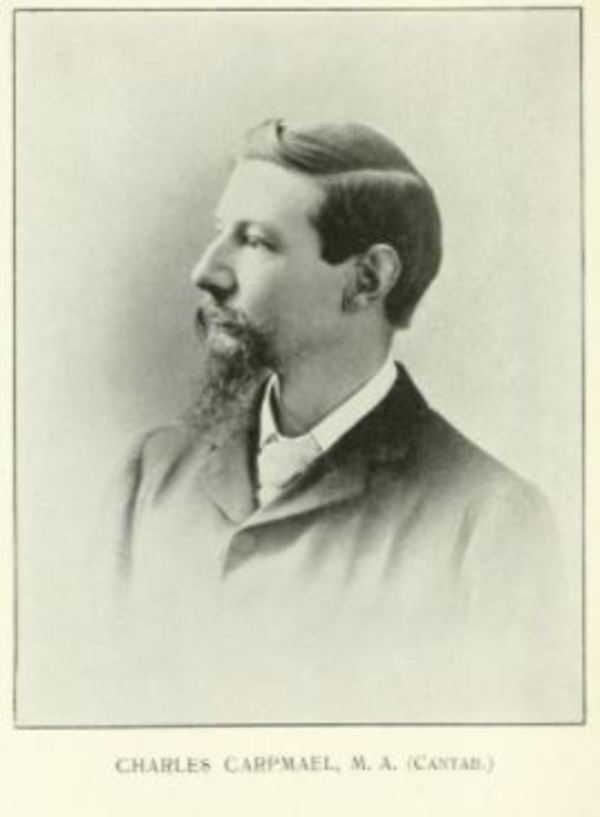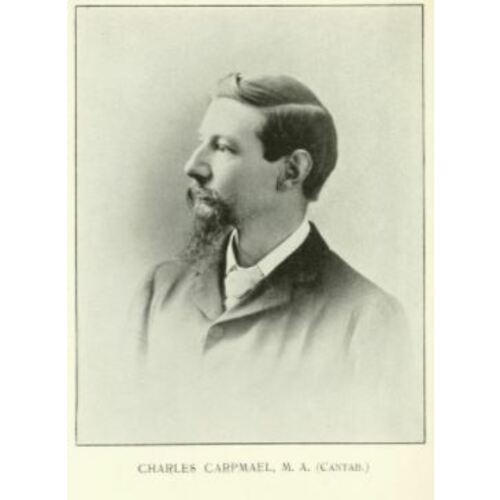
Source: Link
CARPMAEL, CHARLES, meteorologist, astronomer, and office holder; b. 19 Sept. 1846 in Streatham, London, England, eighth son of William Carpmael, a well-known patent agent, and Sarah Pitt; m. 22 June 1876 Julia McKenzie in Toronto, and they had one son and one daughter; d. 21 Oct. 1894 in Hastings, England.
Charles Carpmael received his elementary education at the Clapham Grammar School under Charles Pritchard, later Savilian professor of astronomy at the University of Oxford. He earned a mathematics scholarship to the University of Cambridge in 1865, and he was sixth wrangler at graduation in 1869. Elected a fellow of St John’s College, Cambridge, in 1870, that same year he joined a British expedition to Spain, where he took spectroscopic observations of the corona during an eclipse of the sun.
Carpmael visited Toronto during a tour of North America in 1871, when George Templeman Kingston*, director of the Toronto magnetic observatory, was establishing the Meteorological Office (later the Meteorological Service) of Canada. Kingston’s primary goals were the recruitment and training of a network of observers to collect climatic and weather data; the tabulation of this information at Toronto in the hope of establishing long- and short-term patterns; and ultimately the forecasting with some reliability of daily conditions for those whose livelihood depended upon them. Secondary objects were the establishment of a time service, the determination of latitudes and longitudes, and the correction of magnetic readings. Carpmael’s interest in the program and his reputation led to his appointment in October 1872 as deputy superintendent of the office, and when Kingston retired early in 1880 he became superintendent and director of the observatory.
Most of Kingston’s hopes were realized by Carpmael before and after 1880. By 1877 he had extended the network of observers, which at the time of his appointment stretched from Halifax to Winnipeg, to British Columbia and the North-West Territories. His mathematical leanings, especially his inclination towards the theory of probability, enabled him to plot the ascending curve of the service’s success in forecasting and in allegedly reducing the number of shipwrecks as sailors gained confidence in the storm warnings posted in ports and harbours. Farmers too came to rely on the warnings, which from 1885 were displayed on railway cars. Tidal observations had traditionally been part of coastal meteorological work, but in 1891 Carpmael imported self-recording gauges from Scotland. The next year he started to set up ten stations to plot long-term tide patterns. He had also begun in 1880 to proclaim the need for ocean and arctic observations.
Carpmael’s stamp on the Meteorological Service was reflected in his persistent efforts to have observers and other assistants recognized as civil servants and, more directly, in the nature of the research at the Toronto observatory. Besides undertaking work in solar physics, including spectroscopy, he involved Canada in international scientific events. Chief among these were the observation of the transit of Venus (1882) and the First International Polar Year (1882–83), the latter requiring frequent magnetic observations and the submission of the tabulated results to the International Polar Commission. In 1883 Carpmael established a dominion time service and assumed the superintendence of the astronomical observatories at Quebec City [see Edward David Ashe] and Saint John, N.B. The service determined correct time by astronomical observations and chronographs at the three dominion observatories and the one at Montreal and by regular exchanges of the results.
A charter-member of the Royal Society of Canada, Carpmael served as president of section iii (mathematical, physical, and chemical sciences) in 1882 and 1886 and vice-president in 1884 and 1885. He also sat on the council of the Canadian Institute and was president in 1888, when the institute’s interests were turning increasingly to anthropology. In 1890 he helped found the Astronomical and Physical Society of Toronto. As president until 1894, he organized systematic magnetic observations in order to study earth currents. A lengthy illness, reputedly cancer of the stomach, necessitated a visit to England, where he died in 1894.
Charles Carpmael’s publications include On the reduction of the barometer to sea level; with tables (Toronto, 1878) and several items in the RSC Trans.: “On the law of facility of error in the sum of ‘n’ independent quantities, each accurate to the nearest degree,” 1st ser., 1 (1882–83), sect.iii: 9–12; “On the determination in terms of a definite integral . . . and on the deduction therefrom of approximate values in certain cases,” 1st ser., 3 (1885), sect.iii: 101–10; “Presidential address,” 1st ser., 4 (1886), sect.iii: 1–5; and “The longitude of the Toronto observatory,” 1st ser., 6 (1888), sect.iii: 27–53 (with Clement Henry McLeod).
Can., Environment Canada, Atmospheric Environment Service, National Headquarters (Toronto), Meteorological Service, superintendent’s letter-books; Charles Carpmael, letter-books, 1870–95. Astronomical and Physical Soc. of Toronto, Trans., 1890–94. Can., Parl., Sessional papers, annual reports of the Dept. of Marine and Fisheries, 1872–85, 1893–94, and the Dept. of Marine, 1886–92. Cyclopædia of Canadian biog. (Rose and Charlesworth), vol.1. Suzanne Zeller, Inventing Canada: early Victorian science and the idea of a transcontinental union (Toronto, 1987). M. K. Thomas, “A century of Canadian meteorology,” Can., Atmospheric Environment Service, Annual report of operations ([Toronto]), 1971–72: 1–20.
Cite This Article
Suzanne Zeller, “CARPMAEL, CHARLES,” in Dictionary of Canadian Biography, vol. 12, University of Toronto/Université Laval, 2003–, accessed February 27, 2026, https://www.biographi.ca/en/bio/carpmael_charles_12E.html.
The citation above shows the format for footnotes and endnotes according to the Chicago manual of style (16th edition). Information to be used in other citation formats:
| Permalink: | https://www.biographi.ca/en/bio/carpmael_charles_12E.html |
| Author of Article: | Suzanne Zeller |
| Title of Article: | CARPMAEL, CHARLES |
| Publication Name: | Dictionary of Canadian Biography, vol. 12 |
| Publisher: | University of Toronto/Université Laval |
| Year of publication: | 1990 |
| Year of revision: | 1990 |
| Access Date: | February 27, 2026 |



